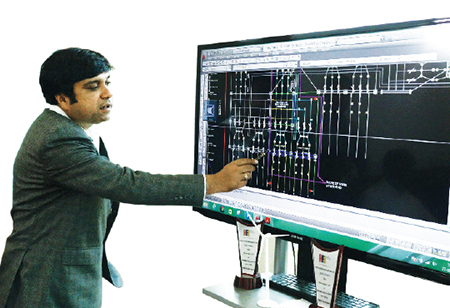Energy Consulting Business passing Through a Transition phase
By Ashish Agarwal, Head Solar Business,
Hero Future Energies
 Dependence on hydrocarbons- oil, coal and natural gas- for our energy needs has been the norm from the time immemorial. Factoring this, the overall energy sector has been shaped up accordingly in mining oil/coal, creating logistics network to transport these fuels into power plants and converting these fuels into more usable form of energy and electricity.
Dependence on hydrocarbons- oil, coal and natural gas- for our energy needs has been the norm from the time immemorial. Factoring this, the overall energy sector has been shaped up accordingly in mining oil/coal, creating logistics network to transport these fuels into power plants and converting these fuels into more usable form of energy and electricity.
However, since 2008, there has been a paradigm shift in the way and form of the energy consumption. Globally, people have been adapting to alternative energy sources leading to the transformation in the energy consumption. Thus, Energy is now becoming more decentralized. Recently, Government of India announced a target to install 175 GW of renewable energy projects out of which 40 GW will generate through solar roof top. As the adoption of solar energy will reach the highest penetration level; every house will become an energy generating source.
Changing Dynamics of Energy Sector
Oil and gas sector and power sector traditionally has few large players as the business demands significant investment flow. When Government of India invited bids for ultra-mega thermal projects, 10 players participated in each bid. On the other hand, the solar bid held by Indian Government this year saw participation from 30+ bidders, which will likely increase in near future.
Technological complexity dynamics have also changed. Renewable energy installations are much simpler with less complicated designs resulting in simpler logistics and supply chain management. The number of components is far fewer, and hence logistics and supply chain is much simpler. Also, the contract duration and contract value are much smaller which results in easier contract management. This altered environment brings new challenges to the energy consulting industry. On one hand, renewable energy reduces the complexity of designs and construction, and on the other hand introduces new elements. Resource estimation (Wind/Solar) is an intricate science which requires complex software and diverse skill sets. It is not easy to acquire capability to do resource assessment.
This has embarked consulting firms a new avenue. Similarly, scheduling and forecasting of energy is another such area. Real time scheduling of renewable energy is a challenging task and often require specialized agencies. Forecasting of power on daily basis require knowledge of weather forecasting as well knowledge of wind generators and solar systems. Traditionally, weather forecasting was conducted by government agencies. Engineering consulting firms now needs climatologist and engineers to provide turnkey solutions to its clients.
Renewable energy is distributed in nature. This implies managing larger number of systems scattered over a huge area as compared to few concentrated thermal plants. Hence, grid management is an integral part of every project management. Demand management and smart grid would become the norm of the day and lot of investment would happen in making grid more responsive to the vagaries of renewable energy. As per Mercom Capital Venture capital (VC) funding (including private equity and corporate venture capital) for Smart Grid, Companies have received $81 million in 12 deals in Q3 2015, compared to $104 million in 18 deals in Q2 2015.
Impact on Energy Consulting Firms
Traditionally, Energy consulting has been focused on oil and gas industry and power plant engineering. Large projects, running over multiple years were just the norm. By acquiring few big clients with large projects, steady businesses were assured for 3 - 4 consecutive years. But, the Alternative sources of energy have completely changed the dynamics of the industry. Renewable energy, particularly, solar and wind has much lesser construction time period and reduced individual project capacities. So now, consulting firms needs to have more nimble and flexible approach, apart from having, multiple client engagements for shorter duration.
As renewable energy projects are technologically not cumbersome, the developers can easily manage the projects and provide consulting services in minimum time required. The value proposition for hiring consulting firms needs to be efficient. However, unlike the conventional energy sector dominated by big firms, renewable energy sector is dotted with numerous small players, and as a result capability gaps are more obvious. Thus, there exists an opportunity for consulting firms. Even through concept selling, consulting firms can add demonstrate value proposition to clients clearly.
Adopting to the changing environment
Every consulting firm to align with this evolving environment must bring changes in the Organizational Design. Even, the teams should be restructured to response to the client’s demand of multiple projects of short duration at a time within optimized cost. A way out to this hassle is to have a boundary less organization structure, having no boundaries to deal with such as departments and organizational hierarchy, which is much more flexible.
Instead of having departments, companies use the team approach. In order to eliminate boundaries, organizations use virtual, modular, or network organizational structures. There is handful of permanent employees; however specialists should be hired when situation arises. Besides, weather forecasting, semiconductor manufacturing and quality control, smart metering technology and battery technology are some of the new areas where consulting firms should explore deeper. Even, the client acquisition methodology would also undergo a drastic transformation, and the industries focus would transit from firm credential based approach to more personalized approach. So, to win orders from clients, consulting firms should clearly identify areas of value creation and demonstrate value creation.







